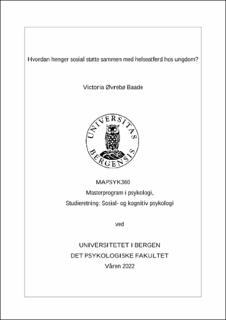| dc.contributor.author | Baade, Victoria Øvrebø | |
| dc.date.accessioned | 2022-06-21T23:57:10Z | |
| dc.date.available | 2022-06-21T23:57:10Z | |
| dc.date.issued | 2022-06-03 | |
| dc.date.submitted | 2022-06-21T22:02:30Z | |
| dc.identifier.uri | https://hdl.handle.net/11250/2999908 | |
| dc.description.abstract | Deltakelse i ulike risikoatferder kan by på store samfunnsmessige utfordringer og kostnader. Det kan også være potensielt skadelig for ungdom å involvere seg i risikoatferd, da dette kan føre til en rekke ikke-smittsomme sykdommer som hjerte-karsykdommer, diabetes og kreft. Forekomsten av slik helseatferd, er derfor viktig å forske på. Positiv ungdomsutvikling (PYD) er et perspektiv sett i lys av hvilke tiltak som skal til for å fremme sunn helseatferd, fremfor å kun fokusere på å redusere risikoatferd. Tidligere studier indikerer at sosial støtte har en positiv effekt på ungdommers helseatferd. Denne studien har som mål å undersøke forholdet mellom sosial støtte og helseatferd hos norsk ungdom. Sosial støtte fra foreldre, i skolen og fra andre voksne, samt sunn helseatferd (fysisk aktivitet), risikoatferd (alkoholbruk og skulking) og illegal/straffbar atferd (vold) studeres. Utvalget består av 591 elever i norsk videregående skole, i alderen 15-19 år (gjennomsnittsalderen er 16,7). Regresjonsanalysen viser signifikante sammenhenger mellom sosial støtte og sunn helseatferd (fysisk aktivitet), i tillegg til risikoatferdene skulking og vold. Sosial støtte er derimot ikke signifikant med risikoatferden alkoholbruk, selv om korrelasjonsanalysen viser signifikant sammenheng mellom sosial støtte og alle de studerte helseatferdene. Disse resultatene stemmer med oppgavens hypotese om at ungdom som mottar sosial støtte rapporterer høy score i sunn atferd og lavere score i risiko- og straffbar/illegal atferd. Videre forskning er nødvendig for å undersøke hvilken sammenheng de andre utviklingsressursene har på helseatferd hos norsk ungdom. Denne studiens funn kan brukes for å iverksette helsefremmende tiltak for barn og ungdom i Norge. | |
| dc.description.abstract | Participation in risk behaviors can present major societal challenges. It is potentially harmful for adolescent to get involved in risky behaviors, as this can lead to a number of non-infectious diseases, such as cardiovascular disease, diabetes and cancer. The prevalence of such health behaviors is therefore important to research. Positive youth development (PYD) is a perspective that focuses on what measures are needed to promote healthy behavior, rather than just focusing on reducing risk behavior. Previous studies indicate that social support has a positive effect on adolescents' health behaviors. This study aimed to investigate the relationship between social support and health behaviors in Norwegian adolecent. Social support from parents, at school and from other adults, as well as healthy behavior (physical activity), risk behavior (alcohol use and truancy) and illegal behavior (violence) were studied. The sample consisted of 591 students in a Norwegian high school, aged 15-19 (mean age, 16.70 yerars). The regression analysis showed significant associations between social support and healthy behavior (physical activity), and the risk behaviors truancy and violence. Social support and alcohol use was not significantly related, although the correlation analysis showed that social support correlated significantly with all of the studied health behaviors. These results matched the hypothesis that young people who receive social support will report high scores in the healthy behavior and lower scores in risky and illegal behaviors. Further research is needed to investigate the connection between other developmental assets and health behavior of Norwegian youth. The findings of this study can be used to implement health-promoting measures for youths in Norway. | |
| dc.language.iso | nob | |
| dc.publisher | The University of Bergen | |
| dc.rights | Copyright the Author. All rights reserved | |
| dc.subject | positiv ungdomsutvikling | |
| dc.subject | risikoatferd | |
| dc.subject | helseatferd | |
| dc.subject | norsk ungdom | |
| dc.subject | sosial støtte | |
| dc.title | Hvordan henger sosial støtte sammen med helseatferd hos ungdom? | |
| dc.title.alternative | How is social support related to health behavior in adolescents? | |
| dc.type | Master thesis | |
| dc.date.updated | 2022-06-21T22:02:30Z | |
| dc.rights.holder | Copyright the Author. All rights reserved | |
| dc.description.degree | Masteroppgave i psykologi | |
| dc.description.localcode | MAPSYK360 | |
| dc.description.localcode | INTL-HF | |
| dc.description.localcode | MAPS-PSYK | |
| dc.description.localcode | INTL-MED | |
| dc.description.localcode | INTL-JUS | |
| dc.description.localcode | INTL-SV | |
| dc.description.localcode | INTL-PSYK | |
| dc.description.localcode | INTL-MN | |
| dc.description.localcode | INTL-KMD | |
| dc.subject.nus | 736999 | |
| fs.subjectcode | MAPSYK360 | |
| fs.unitcode | 17-35-0 | |
